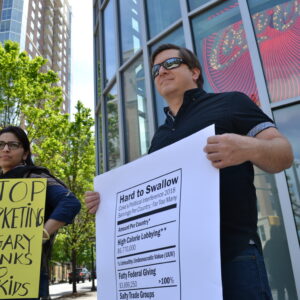Big Food and Soda have a big sway over everything from what our children eat at school to whether essential workers get paid sick leave to how the world’s food systems can withstand a pandemic.
And massive corporations like Coca-Cola, McDonald’s, and PepsiCo spend untold millions on electing and lobbying public officials, and on science, charity, and trade groups to influence policy and the politics of food, in many cases, misleading us about the harms of their unhealthy products. But here’s the thing: we don’t know how much these corporations are spending, because in many cases and across vast regions around the world they don’t disclose that information.
We’ve successfully gotten resolutions into the official agendas of the shareholders’ meetings of Coca-Cola, PepsiCo, and McDonald’s, and with our allies, we’ll be at the meetings, organizing to garner shareholders to vote in favor of global transparency. Will you add your voice and demand that McDonald’s, Coca-Cola, and PepsiCo get their political activities and spending out of the shadows? Our food systems demand sunlight from the fields to the board rooms.
While corporations like Coca-Cola, PepsiCo, and McDonald’s have to disclose what they spend on federal U.S. elections and lobbying, they offer little to no information about how they are attempting to influence politics and policies of food, nutrition, and public health outside of the U.S. They also don’t have to disclose what they are spending on outside research and charity, or trade associations and groups that are pushing the industry’s interests globally.
And this spending has devastating real-world consequences. For example, Coca-Cola funded the global industry lobby group International Life Sciences Institute for decades to produce research and to stall progress on vital nutrition and public health policy in India, Mexico, China, and Brazil. McDonald’s enduring support for the anti-worker trade groups like the National Restaurant Association has long suppressed a living wage for tens of millions of workers across the U.S. McDonald’s on the other hand sponsors the International Food and Beverage Alliance (IFBA), which has been caught secretly lobbying to gain influence within the World Health Organization. PepsiCo similarly supported the trade association, ConMexico, which lobbied the Mexican government to postpone food labeling regulations generating widespread criticism due to negative impacts on public health.
Transparency is the first step toward curbing toxic corporate influence. At the very least, these corporations should level with the shareholders and the public about these activities. Having to do so will make these corporations think twice about bankrolling, for instance, public officials that are assailing voting rights, abortion rights, labor rights, public health, and climate action.
And this spring, some of the most aggressive corporations in global politics are facing shareholder votes that would compel them to open their books…do so globally…and on what they spend to subvert human rights, public health, politics, and environmental policy.







